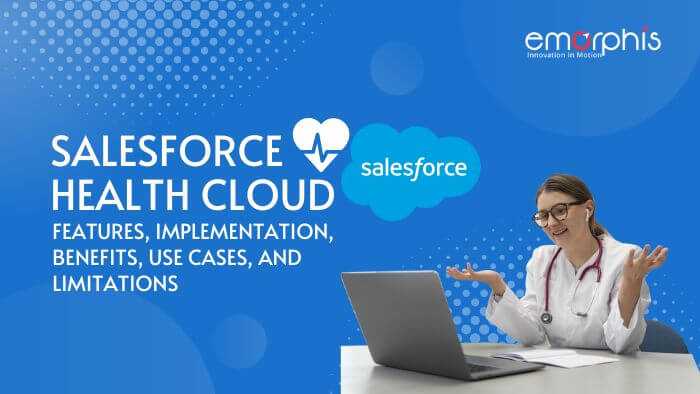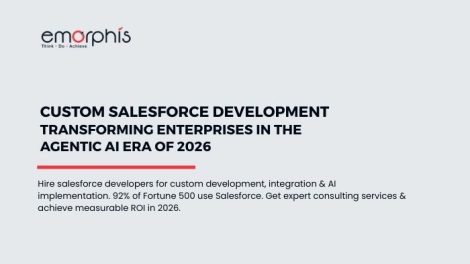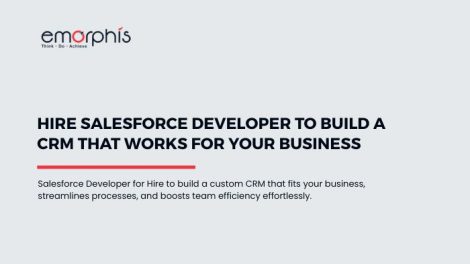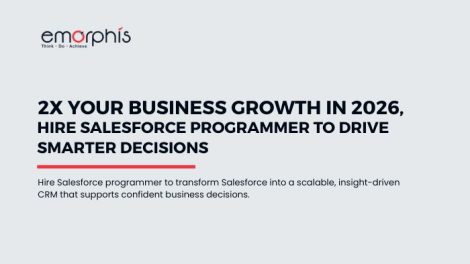Overview
Healthcare organizations relied on EHRs to manage patient & clinical data before the pandemic. But this global epidemic has transformed how the healthcare sector delivers virtually with modern technologies. The transformation unlocked the limitations of EHR and also new choices for consumers and organizations to integrate clinical & non-clinical data to develop a competitive edge. The new solutions are focusing on the prospective business in the healthcare industry and becoming more consumers focused. As a matter of fact, healthcare organizations need to connect teams, automate the process, enhance their clinical systems, and secure their business data to personalize the consumer experience at every step. As a result, the focus on health cloud technology and especially the usage of Salesforce Health Cloud has reimagined the delivery of the best healthcare experience.
Please put on your seat belt, and let’s explore how Salesforce Health Cloud is transforming the current healthcare industry.
What is Health Cloud?
Health Cloud is a cloud-based CRM (Customer Relations Management) system for healthcare. It connects patients, healthcare providers, and all related entities such as Medtech, pharma, public sector, etc, in a centralized system. The health cloud software is designed to cover all the healthcare industry needs and is built on the Salesforce CRM platform. Moreover, health Cloud is a perfect solution for all the challenges the healthcare industry is experiencing today. It also makes one-to-one relationship management and engages a large number of tech-savvy patients.
According to Salesforce.com, more than 70% of millennials choose doctors who actively engage with technology in health management; 63% of people expect to share their health data through wearable devices.
Salesforce.com
Salesforce health cloud was launched in 2016 and is developed by salesforce in partnership with Accenture, Deloitte, MuleSoft, Persistence, Phillips & PwC.
It enabled and also helped several healthcare organizations to convert challenges into opportunities and moreover developed capabilities to match industry trends. This Health IT CRM solution manages Doctor-patient relationships through personalized engagements and also offers record management services that reduce cost and improve customer experiences. It provides a complete view of patients on a single, unified platform, thus evolving healthcare to a patient-centric approach instead of a medical record-centric one. This also assists in meeting the needs of patients better. Thus, Salesforce Health Cloud has made possible the rethinking of the care delivery model that focuses on patient preferences.
Salesforce health cloud, as you know, is a clinically focused platform that enables procedures such as.
- Acquiring patients.
- The marketing campaign for patients.
- Patient engagement.
- Contact management.
- Physician Recruitment.
- Risk classification of patients.
- Monitoring of care plans.
- Patients’ survey /evaluation.

Health Cloud Models
Several data models are available in the health cloud, such as.
- Household Health cloud: This module takes through several health cloud data models to understand the purpose. Once the organization chooses a data model, it can customize it by adding its objects, fields, and automation.
- Clinical data model: The EHR data model has more than 30 EHR based on FHIR (Fast health care interoperability resource) standard. This permits full accessibility to patients’ histories from the health cloud.
- Claim data & Insurance model: The health cloud helps access preauthorization and verification and track membership data and a claim.
- The data model for care program : Helps healthcare professionals and organizations to conduct services like remote monitoring, financial help, access to medication, and also patients can be reached at any time.
- Social health data model: This data model looks into patients’ socioeconomic and environmental status, thus helping healthcare organizations gain an outlook that influences wellness, medication default, and adherence to the treatment schedule. By intervention through the help of a model, the health setbacks of patients and members can be reduced.
- Management & provider data model: The management health cloud data model is a health insurance plan that helps health care providers render service per the health plan’s policy.
- The provider data model: It helps patients and organizations to find the right specialty in the patient’s locality at the need of the hour.
Challenges In Healthcare That Need Health Cloud
The rising demands of the public and digitalization of healthcare processes have their kind of challenges that limits better facilities and collaboration for patients and also providers.
Here are some of the challenges addressed by Health Cloud.
1. Huge upfront costs and hefty hardware infrastructure
The healthcare industry is a complex one, and it’s becoming more so each year. It’s important to realize, the challenges of the industry are immense from the high upfront costs to the hefty hardware infrastructure that’s required to keep up with demand. Also, various types of software solutions, their integration, and hardware needs for them make it more complex. However, salesforce for healthcare saves time cost, and any additional hardware. As a matter of fact, the same can be used from any hardware and can seamlessly integrate with various know solutions. It also helps in organizations opting for various salesforce customization as per the need. Hence it saves costs and hardware infrastructure.
2. Frequent downtime and improper communication
Workflow situation impacts employee productivity. After continuous usage, the on-premise hardware or systems get drained out, also hampering the workflow and losing critical data. This leads to inefficient communication as there is no data to refer to. As a matter of fact, this is where the Health cloud assures a guaranteed uptime ensuring effective communication and reduced data redundancies.
3. Data Breach and Security Concerns
As the healthcare industry moves around a massive amount of data from multiple sources like diagnostics, path labs, patient reports and also diagnoses, doctor or caregiver certificates, prescriptions, etc.; any data loss is a big disaster. Any data stored on a hardware device is prone to theft and loss that can never be retrieved. The Salesforce healthcare cloud ensures data backup from any data center located globally. Salesforce for healthcare benefit of data centers is that if by chance, one data center is inaccessible, the user can back up by logging in through credentials from another data center. Moreover, Salesforce health cloud has many security metrics, such as end-to-end encryption and IDS/IPS firewalls, that keep healthcare data breach free and safe.
Salesforce Health Cloud Features
Individual patient care
Medical experts can give more attention to patients with individualized services. As a matter of fact, there are no inconsistencies, security loopholes, service delays, and silos as the salesforce health cloud provides a broader picture of patients’ health.
Ease of care plan
Salesforce health cloud offers an easy and also efficient way to enroll in care plans. The platform provides the best solution and moreover, it creates a simple need-based care plan. Thus, the salesforce for healthcare improves the quality of service and reduces operating costs.
Real-time Communication
The cloud ensures that patients remain in contact. In fact, healthcare organizations and professionals can get accurate time health care advice for patients’ benefit.
Complete patients’ information
In fact, with just one click, healthcare organizations or professionals can get the complete current health status of various patients or individual patients. In addition, appointment, medical history, and also details of medicine administered.
EHR Integration
Salesforce health cloud lines up existing EHR (electronic health records) and moreover, offers an integrated and centralized view of all the tasks of medical treatment plans. Our Salesforce Integration Experts help you integrate Health Cloud and EHR to leverage the following benefits:
- A holistic patient view drives superior outcomes.
- Works as a modern iPaaS (integrated- platform-as-a-service), allowing a seamless flow of critical data easily & quickly.
- Provides a fully collaborative hub.
- Improves decision-making and faster care delivery.
- Streamline workflows to enhance staff efficiency and satisfaction.
- Ensures compliance & data governance thereby minimizing risks.
Experience
Salesforce health cloud enables customized interactions across multi-channels, including online and also by phone. The medical portal can answer individual patients’ questions. This is how Health Cloud helps in providing a better patient experience.
Customized care-group program
With the help of the Salesforce health cloud, the medical equipment connected mainly assists patients with optimal care by developing customized patient programs. Patients with similar medical conditions can connect, keep up with their well-being, and also contribute to dealing with their medical conditions effectively.
Customize through Salesforce AppExchange
The Salesforce Health Cloud is a customizable, integrated platform that allows users to access data and reports, as well as create custom dashboards. The salesforce for healthcare can be customized through AppExchange’s numerous pre-integrated apps allowing a seamless user experience.
Shield Security
Salesforce shield provides that extra layer of trust, given your platform is connected and also integrated with multiple applications. The key security tools include field audit trial, shield monitoring, platform encryption, and also event monitoring that assists with compliance and governance for your business-critical applications.
The features mentioned above make Salesforce Health Cloud the leading transformative healthcare platform of the next gen. Also, along with the said features, one of the critical differentiators of Health Cloud is “Interoperability”.
Salesforce Health Cloud also complies with HIPAA regulations that are federal protections for personal health information. For any vendor/ system integrator/ authorized Salesforce vendor, a business associate agreement (BAA) is signed in order to meet HIPAA compliance requirements. A signed BAA means that the Salesforce Health Cloud development vendor is taking careful consideration to protect PHI (protected health information) data. In the light of the above, it is the healthcare organization’s responsibility to ensure only authorized access.
Along with HIPAA, there is another healthcare compliance HL7 (Health level seven), which ensures a secure exchange of electronic health records. HL7 facilitates interoperability and defines standards such as FHIR (Fast Health Interoperability Resources), which works with the HL7 v2.3 database framework. It assists in storing EHR data models that include Clinical documentation architecture, admission-discharge-transfer data, observation results, and also other FHIR data.
Salesforce Health Cloud Benefits
As a matter of fact, one of the largest industries in the world is the health sector, in 2019, the estimated turnover is about 282 billion dollars, and the expected forecast is to rise in 2027 at a CAGR of 7.9%. The traditional way of doing things has influenced healthcare services, however, in the modern era, healthcare is shifting towards patient care. Here Salesforce health cloud comes into the picture, moreover with salesforce for healthcare helping healthcare organizations assemble functionality for par excellence healthcare delivery.
Salesforce health cloud offers several benefits
Patient assessment
All data for a patient is processed in a cloud in a single central location. The information is protected and is provided access to only a person to whom the organization gives access by all means. Medical equipment and wearable devices can be incorporated with the salesforce health cloud. Furthermore, the patients can transfer data with handheld devices on the cloud. This is of immense importance and helps with diabetes, heart disease, asthma, aged patients, and also other severe health hazards. It also covers post-discharge treatment.
Patient Participation
Salesforce health cloud with ample functionalities authorizes health care providers to securely link and also allocate tasks across the caregiver network. Gathering information from EHR salesforce health cloud puts the patients on treatment priority, thus helping health care professionals to see full health details of patients. Salesforce health cloud service can be extended to mobile, where caregivers can send secured SMS texts and emails to patients on the mobile platform, in particular, which enhances relationship bonds.
Feedback
Salesforce health cloud automates recording for feedback. Regular feedback fortifies health care. Patients usually, after the last consultation, keep asking health consultants. Salesforce health cloud meets CRM objectives and develops loyal customers.
Integration
The most significant advantage of the salesforce health cloud platform is its flexibility and compatibility with legacy systems or in particular existing systems. Salesforce health cloud integrates with the existing system and seamlessly updates Electronic Health Records, Electronic Medical Records, Enterprise resource planning frameworks, and also other solutions.
Data compilation
The data assessment accuracy of the Salesforce health cloud helps health care professionals to recognize patients and ailments. As a matter of fact, Salesforce Health Cloud is a product that helps healthcare professionals and patients better manage their medical records and provides them with additional services. This includes things such as managing appointments, creating reminders, sending notifications to patients via email or text messages, tracking lab results, organizing files according to categories like allergies or medications, creating reports on patient visits or medical conditions, etc.
Real-time connectivity
Important to realize, it is one of the key benefits of the Health cloud is that the app helps answer patients’ queries and issues to health care professionals. In fact, real-time connectivity helps bring trust and reliability over a period of time.
Personalized care
Salesforce health cloud assessments and Salesforce EINSTEIN AI connectivity solutions help doctor-patients communicate beyond scheduled visits and enhance patients’ experience and satisfaction.
You can also check out this Salesforce Health Cloud FAQs blog to get all your queries answered.
Salesforce health cloud offers advantages to various groups involved in the health care industry.
Benefits to provider
- Salesforce health cloud creates patients’ customized health plans.
- In particular, strengthens and helps communication and coordination at ease with patients by providing a centralized view to the providers.
Payer’s benefit
- By all means, it provides multi-channel communication and automates flow.
- Also, ease of managing patients’ health care plans and programs.
- Moreover, it customizes health care services.
Benefits To The Therapeutic Companies
- On the positive side strengthens the sales and accounts department.
- In particular, increases patients’ number and experience.
Service Cloud Vs Health Cloud
When in the healthcare business, you look for technology solutions to help you stand out from the crowd. You do not only look to provide excellent services but also to yield improved healthcare outcomes. This is where healthcare businesses usually get confused with “Service Cloud OR Health Cloud”. Have a look at the comparison table below that illustrates the difference between Service Cloud and Health Cloud.
| S No. | Service Cloud | Health Cloud |
| 1. | Provides full-service management | Provides total care management |
| 2. | For Care Team: 1. Allows standard task management 2. Salesforce mobile 3. Lightning experience | For Care Team: 1. Allows standard task management 2. Emergency response management 3. Patient model 4. Health analytics 5. Care team collaboration 6. Care Plan 7. Customization & intelligent task management 8. Advanced patient categorization & listing 9. Salesforce mobile 10. Health Cloud empowers 11. Utilization management 12. Provider cards 13. Einstein Analytics 14. Field service lightning integration 15. Lightning experience |
| 3. | No Patient View | Holistic patient view with – Profile care – Health timeline – Care Network |
| 4. | Supports only customizable reports & dashboards for clinical data management | Provides clinical data model, patient model, HL7 v2 ADT Adapter and customizable reports & dashboards for clinical data management |
| 5. | Does not allow EHR & HL7 integration | Integrates well with EHR and HL7 |
| 6. | Supports Case management features | Supports Case management features |
| 7. | Allows better operations management with Service contracts & entitlements, asset & order management | Allows better operations management with Service contracts & entitlements, asset & order management |
| 8. | Allows integration and customization with Google apps, App-exchange, and Lightning app builder | Allows integration and customization with Google apps, App-exchange, and Lightning app builder |
Health Cloud Implementation
When it is set correctly, Salesforce Health Cloud is at the center of your healthcare organization. In fact, implementing and administering the health cloud means that you are making the health cloud features available to the users by configuring the user interface and data flow.
To start with the health cloud implementation, it is in particular essential to understand to map source EHR clinical data to the Health cloud account (for patients, care providers, and other entities). Most of the APIs, objects and features in the health cloud are a part of the Salesforce platform, thus at Emorphis Technologies, we understand the anatomy of the health cloud required for customization and offer salesforce customization services.
Health cloud implementation involves managed and also unmanaged-add-on packages, all-involved entities accounts (patient, provider, Medtech, etc), domain and chatter settings, licenses, compliance checks, and permission sets to name a few.
Steps of Health Cloud Implementation
Let’s quickly get to the steps involved in the health cloud implementation:
- Preparing to enable
- Person accounts
- Contacts
- Chatter settings
- Set up Health Cloud
- Installation of health cloud packages and adding users
- Configuring profiles
- Assigning permissions and licenses
- Setting field access
- Protecting with Salesforce shield
- Admin app
- Customizing the console
- Health Cloud apps installation
- Coding and Reporting
- Setting and managing network providers
There are a lot more steps involved. Want to know how we get the health cloud app installation done?
Connect with Emorphis Technologies Salesforce custom application development experts.
Why Does The Healthcare Industry Need Salesforce Health Cloud?
Covid 19 pandemic has put many industries under tremendous pressure, performance pressure & challenges, especially healthcare. This compelled the healthcare industry to re-evaluate itself and also the existing care protocol. On the other hand, patients’ expectations are changing dynamically. in fact, the future of the healthcare industry is linked to the capability of providing personalized experiences and understanding patients’ needs. Hence, this is why Salesforce health cloud, the mobile-first platform is needed in delivering the right care to the right person at the right time.
To point out, you can connect with a salesforce consultancy services company, Emorphis technologies for more details. As a matter of fact, the health cloud supports interoperability and information exchange by providing real-time patient health data. In fact, given the many benefits and features illustrated in the above sections, the health cloud is the perfect fit for your healthcare organization if you are looking for a comprehensive set of capabilities that include.
- Health data exchange.
- Patient engagement.
- Clinical & patient data security.
- Better care delivery through business empowerment.
- Stronger care team collaboration.
Salesforce Health Cloud Pricing
As per the data provided in August 2022, over the platform for salesforce pricing following is the details.
Health cloud Enterprise: $300/per user/month (billed annually)
Health cloud unlimited: $450/user/month (billed annually)
Starting price: $300/month
Free trial: Available
Free version: Not Available

Conclusion
The Forrester Wave , a guide to the emerging technology market has also recognized Salesforce health cloud as a leader in healthcare CRM for providers and trusted by every healthcare provider organization, large or small, irrespective of size. Salesforce’s health cloud platform helps get the most out of the technology. Healthcare organizations are incorporating the cloud into existing technological infrastructure and also working on configuration per the suitability of hospital, clinic, or healthcare provider needs. Further, tailor-made apps are also available.
If you are in search of a salesforce health cloud company, Emorphis Technologies can assist you with our leading salesforce health cloud services and provide robust solutions. In fact, Emorphis Technologies a salesforce partner provides the best-in-class salesforce consulting services including customization, salesforce integration services, app development, and more. Our company has the best and most experienced salesforce health cloud professionals, certified salesforce developers, and salesforce consultants to help you with your business needs. We bring world-class salesforce health cloud service and establish with health cloud beyond imagination. Want to implement Salesforce Health Cloud? Take benefit of our Salesforce implementation services to get started.







